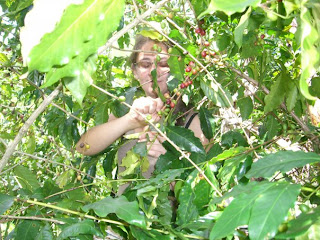Lessons Learned by an FTF Intern
Below, Claire Clugston reflects on her internship with Partners of the Americas' Farmer to Farmer Program:
During my first year as a Master’s Degree Student in Sustainable International Development at Brandeis, I decided to focus my studies and thesis on agricultural development in Latin America. Interning at Partners of the Americas was an excellent opportunity to build on my experience working with coffee farmers as a Peace Corps Volunteer in the Dominican Republic and to gain experience at a programmatic level. Now, as I enter my final week here at Partners, I can say that interning with Farmer to Farmer has been a fantastic experience. I have deepened my knowledge of agricultural development in Latin America and gained some surprising insights as well. Below are what I believe to be the three most important lessons I learned this summer:
During my first year as a Master’s Degree Student in Sustainable International Development at Brandeis, I decided to focus my studies and thesis on agricultural development in Latin America. Interning at Partners of the Americas was an excellent opportunity to build on my experience working with coffee farmers as a Peace Corps Volunteer in the Dominican Republic and to gain experience at a programmatic level. Now, as I enter my final week here at Partners, I can say that interning with Farmer to Farmer has been a fantastic experience. I have deepened my knowledge of agricultural development in Latin America and gained some surprising insights as well. Below are what I believe to be the three most important lessons I learned this summer:
1. The Power of Connections
 |
| FtF Intern Claire Clugston in the Dominican Republic |
In literature about
agriculture, an often repeated lesson is that agricultural projects tend to
spread more quickly than other development activities. While working with
Farmer to Farmer, I learned just how smoothly agricultural knowledge can be
disseminated once the right connections are made. Rather than focusing merely
on quantity, Farmer to Farmer seeks agricultural experts who can provide
targeted recommendations for issues that have been identified by the farmers
themselves. One example is the Farmer to
Farmer volunteers who have helped farmers to identify pests and mites. This
information may only take minutes to convey, but can significantly improve
yields for farmers who have been losing crops. Although experts can change
farmers’ lives in hours or even sometimes minutes, it often takes a long time
to make the right connections. My most frustrating moments as an intern were
the ones in which it seemed as though there was no one in all of the US who could
fill a specific assignment.
2. Honey is a Miraculous Substance
 |
| Jarring Honey |
Working as a Farmer to Farmer intern allowed me to learn
about specific crops and agricultural projects that have been successful in
Latin America. Early on in my internship, one of my tasks involved reading a
report written by a volunteer who was working with honey producers in Haiti.
Through this report, I learned that honey not only can be sold as an income
generating activity, but has great nutritional benefits and can be used to
sanitize and cleanse as well. I had never really thought of promoting honey
projects before interning with FTF, but now I believe that this activity holds
great potential for small scale farmers in Latin America. I also gained hands-on honey processing experience in
what was perhaps my funniest moment as an FTF intern. This was an afternoon
which we spent straining bees’ legs out of honey to be sold as a
fundraiser. Although I have gotten my hands dirty in the field before, I never
expected to be standing in an office in Washington, DC with my arms dripping in
honey.
3. Agriculture Includes So Much More than Growing Crops
After interning at Farmer to Farmer and seeing the wide
range of experts who volunteer with the
program, I have realized that my understanding of what falls under the umbrella
of farming has been extremely narrow. Many Farmer to Farmer volunteers are not
specialists in agriculture, but rather in marketing, labeling, website design,
video production, etc. These skills can be as useful to those involved in the
agricultural production chain as knowledge about irrigation or pesticide use.
Before this summer, I’m sure I would have deemed workshops directly related to
farming more important for agriculture than graphic design classes. Now I see
that both have a great deal of value.

.png)

Claire, you've been of tremendous support this summer. We are very grateful for your willingness to take on any task and your great insight especially with the DR. Muchas Gracias :)
ReplyDeletePartners is all about learning, at every level, within every program and with each individual. Ideally our aspiration to create a "learning network" takes place at a peer-to-peer or person to person level. Claire has captured the magic and spirit of that learning and we thank her for her positive, constructive approach and wish her every success in her ongoing studies and work.
ReplyDelete